Outdoor Essentials
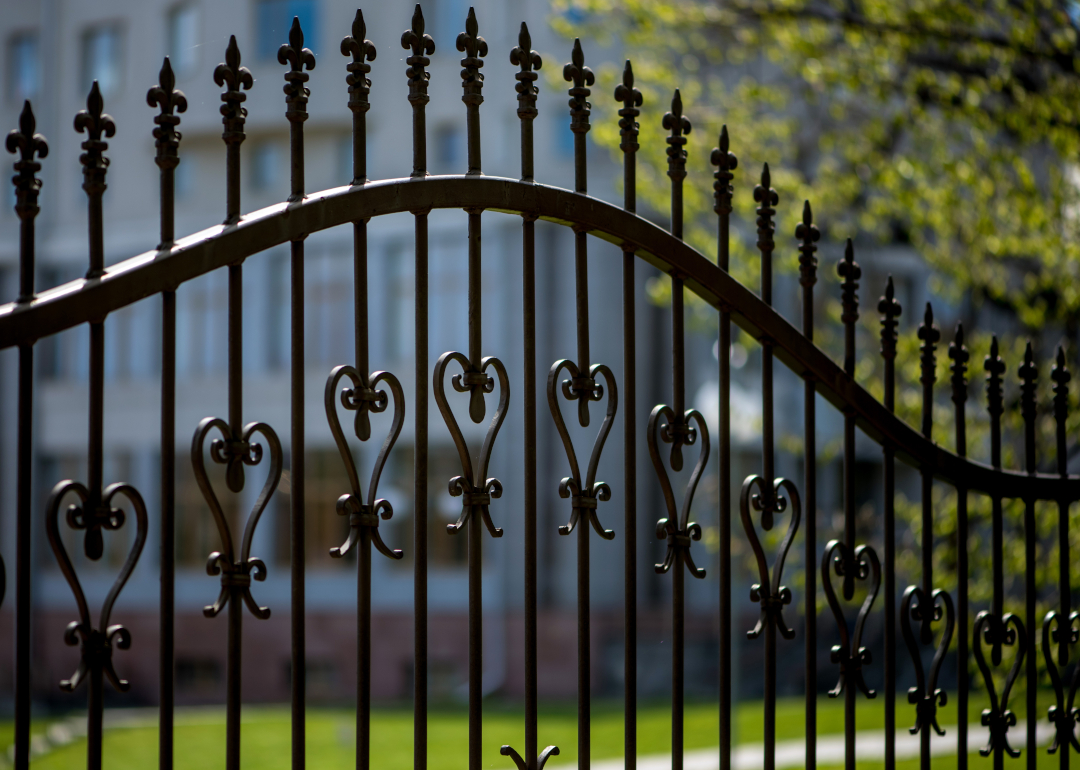
There is perhaps no more exciting realm of home improvement than the outdoor living space, whether plans include a resort-style pool, beautiful landscaping or a covered deck with a fully loaded kitchen and bar area. One aspect that is not always top of mind but is equally important to the bells and whistles is the type of fence that surrounds it all.
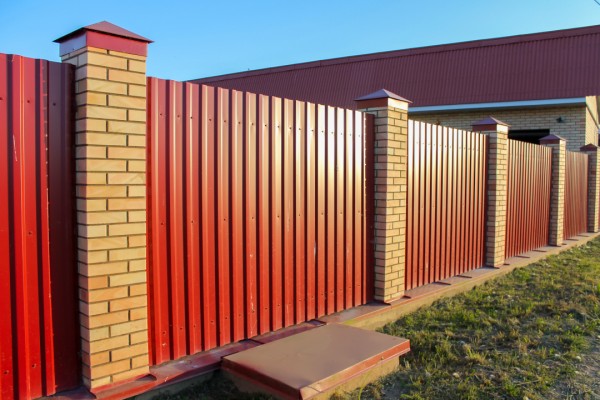 Homeowners may have different reasons for installing a fence on their property, and recognizing their priorities goes a long way in determining the style and type they should ultimately choose.
Homeowners may have different reasons for installing a fence on their property, and recognizing their priorities goes a long way in determining the style and type they should ultimately choose.
"More often than not a homeowner is looking for a fence because of pets and children, and these days I feel like more pools are going in than ever before, so once a pool is in the equation a fence becomes mandatory," says Robert Hook of Progressive Fence & Railing, located at the Jersey Shore. "Privacy is also a huge factor for most folks, which is why the vast majority of fencing you will continue to see is [6-foot-high] privacy. Most customers want something that is low maintenance, but they also want something strong that can stand up to the abuse of the wind and elements, which is extremely key when working one of the islands in South Jersey."
The popularity of home improvement shows on television and the influence of social media mean that homeowners are often more educated than in the past, but meeting with a professional fence contractor can certainly provide even more valuable information.
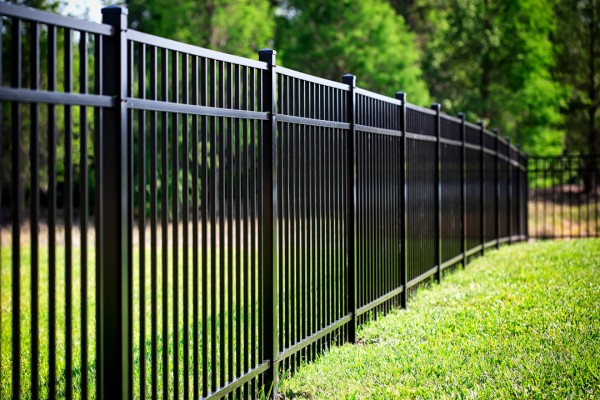 "A lot of times, especially nowadays, people know what they're interested in, what type of fence or style," says Tom Hibbs of Great Valley Fence. "But I will guide them through the process depending on if they need more privacy, if they prefer more of an open look, if they're concerned about pets or kids. ... Most [towns] have adopted the international pool code, which is called the BOCA code. Anybody who has a pool or is thinking about getting a pool down the road would want the fence to meet that code, so that's something I also make sure to mention."
"A lot of times, especially nowadays, people know what they're interested in, what type of fence or style," says Tom Hibbs of Great Valley Fence. "But I will guide them through the process depending on if they need more privacy, if they prefer more of an open look, if they're concerned about pets or kids. ... Most [towns] have adopted the international pool code, which is called the BOCA code. Anybody who has a pool or is thinking about getting a pool down the road would want the fence to meet that code, so that's something I also make sure to mention."
House & Home spoke to several local professionals to learn more about the factors to consider when shopping for a fence, the different types on the market and why customers lean to certain kinds over others.
V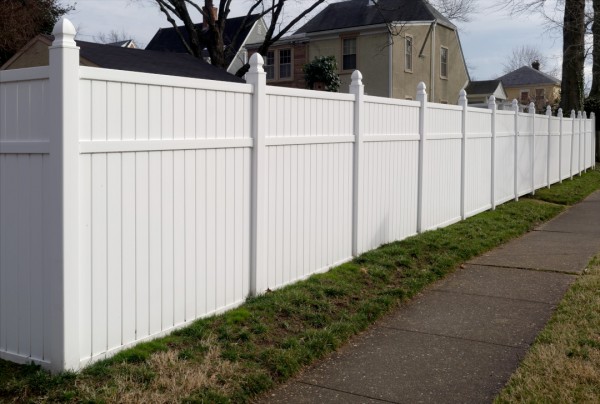 inyl is final
inyl is final
Over the past decade or two, many residential neighborhoods in the Northeast have become dotted with white vinyl fencing. The appeal lies with the durability and low maintenance required of the material.
"Most of our jobs are vinyl," says Danny Leslie of Superior Fence & Railing. "It's maintenance free, it doesn't rot, it doesn't have splits, it doesn't have cracks like wood, it's easier to pressure wash once a year than staining wood, and it looks good too. It comes in different colors—white, tan, adobe, gray—and we have a wood-grain vinyl. ... Are you going to keep getting someone to stain your [wooden] fence or replace a post when it's cracked? Buy vinyl, it's final."
Hook agrees that vinyl is the go-to option for most customers and will continue to be because people do not want to spend the time and money to care for a fence made of other materials, such as wood. He also sees the colors and decorative elements improving each year.
"Colored and wood-grain vinyls have been around for quite some time actually, but there are always new additions being added by our suppliers," he says. "There are definitely some newer and very popular styles that have emerged in the past few years such as horizontal privacy and horizontal semi-privacy fencing. It's a very nice and subtle change from a typical fence using vertical boards or pickets, so it catches your eye.
"There is definitely a big demand right now for almost anything that is slightly different than the norm, whether that is changing the style and specs of the typical fence, mixing and matching colors and even slightly different materials into the equation. There are so many variations when it comes to vinyl, you really have almost unlimited options to choose from."
Hibbs adds that fencing that makes the property stand out is popular at the moment, though it may come with a higher price tag.
"Some people will get different colors but a lot of times it comes down to cost," he says. "There are standard color upgrades—like beige, gray or clay—that won't be nearly as expensive as a custom color. But if they want a custom color to match the siding of their house, for example, like brown, green or orange, those colors can be done but it's a lot more expensive.
"Wood grain is another possibility, but that's going to be on the expensive side too. They have wood grain finishes like mahogany, walnut and a natural color."
Even with those possibilities, the downside of vinyl is that it may not fit as nicely with the natural beauty of the landscape. But in the end, the low-maintenance factor usually seems to win out, and Hibbs offers a suggestion for cleaning a vinyl fence.
"I actually don't recommend powerwashing," he says. "It's a lot softer on the PVC to just use a hose or to hand wash it with environmentally friendly soap and just wipe it down. They will get some grass and dirt on them, but if you powerwash, it could actually affect the integrity of the outside of the PVC. ... It's actually a petroleum-based product, so if you powerwash the outside you could create pores in the material that would promote mold growth."
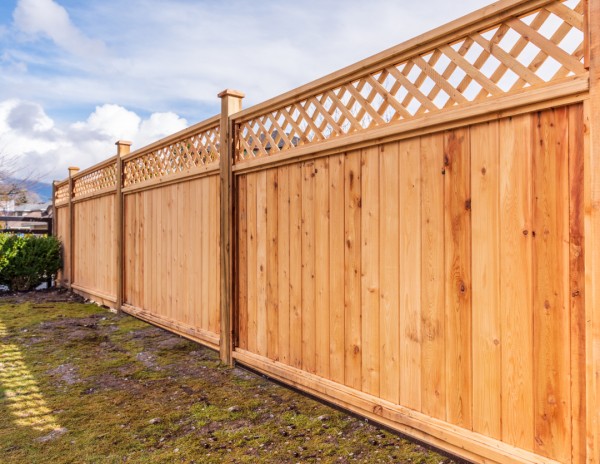 Complementing the natural beauty
Complementing the natural beauty
Leslie often finds that customers in wooded areas prefer fences made from spruce or cedar because of their ability to blend with the natural surroundings of the property. Hibbs agrees but warns that unlike years past, wooden fences are not much cheaper than vinyl, if at all.
"It offers the natural look but lumber is still more expensive right now," he says. "Ten or 20 years ago, because they were still refining PVC and getting used to it as a fence product, PVC was a lot more expensive than cedar. But since the pandemic, lumber prices went up. Some of the standard lumber, like pressure-treated, spruce or fir, those prices came down, but cedar is still relatively expensive."
Hook believes there is a market for wood fences, however, and has started to see the prices get better the further we move away from the pandemic.
"Wood fencing in my opinion has actually come back in a big-time way, at least in the areas that I work in," he says. "You've had years and years of nothing but vinyl seemingly popping up, but the reality is that a beautiful cedar fence may simply match a customer's home and property infinitely better than vinyl will.
"Unfortunately, the market and the cost of lumber has skyrocketed since the beginning of COVID, but things have already begun to normalize. And while the costs of lumber went up, nearly every other material available experienced increases that were substantial, from wood to vinyl, aluminum, steel, composites, etc. Right now, the cost of a vinyl fence versus a good quality cedar fence is very comparable, so it will come down to how that fence accents the property and its surroundings."
Hook always recommended vinyl when he first broke into the industry about nine years ago and still does plenty of jobs with it, but has become partial to wooden fences.
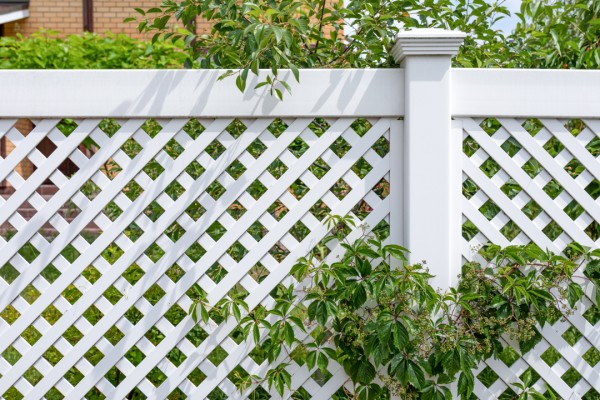 "[I]n my opinion there is a huge market for cedar fencing and other hardwoods such as ipe, which when completed and maintained, simply cannot be matched aesthetically," he says. "Of course, it has to fit the property and the customer's home, but I have developed a true and sincere appreciation for not just the look of wood fencing, but for the time and skill involved in building it, especially when it is a custom design."
"[I]n my opinion there is a huge market for cedar fencing and other hardwoods such as ipe, which when completed and maintained, simply cannot be matched aesthetically," he says. "Of course, it has to fit the property and the customer's home, but I have developed a true and sincere appreciation for not just the look of wood fencing, but for the time and skill involved in building it, especially when it is a custom design."
Aluminum and other options
While chain-link fencing is still heavily used in commercial applications, it is not as common in the residential space as it was 30 years ago. Black aluminum or steel fencing does have its benefits, however, and is often utilized around a pool.
"One of the largest pros for both aluminum and steel is that the fencing is very un-obstructive to your view," Hook says. "Very often it is used surrounding a pool where the customer may already have a fence on their property line, but then the aluminum is installed immediately around the pool as a secondary line of defense for children. Since the posts and pickets are very slender, it doesn't block your view, it simply blends into the background. In many other occasions where customers have their property lines landscaped and planted heavily, well, they want their landscaping to be a highlight of the property. In those situations where privacy isn't a factor and a barrier is needed, it's the perfect solution."
Hibbs adds that just using aluminum around a pool rather than the whole property is a good way to save money, or if it is used in conjunction with a vinyl fence, it can give dogs a place to run around without getting near the pool. There are some negatives, however, particularly in a coastal setting.
"The biggest con to both is that no matter what, metal does not fare too well in a salt-air environment," Hook says. "Without a doubt, steel will eventually rust, aluminum will pit and oxidize, and at some point will need replacement. Now, on the plus side there are a ton of different manufacturers out there, and many offer products with substantially upgraded powder coatings that are designed for a salt-air environment. That being said, they obviously won't last forever, but is there anything on your home or property that will?"
Hibbs says split-rail fencing with welded wire can be an inexpensive option to keep smaller pets and children in the yard, and can also be used to meet pool code. He also suggests black woven wire can be a way to keep other animals out.
"We've done some work like that specifically for deer enclosures," he says. "Some years ago it became a big thing to very easily put up posts and attach deer netting. But the deer would get stuck in it, so our recommendation for deer enclosures would be to go a minimum of 10 feet high and to use the woven wire, which is a very strong, agricultural-grade wire. If deer happen to run into it, they'll just bounce right off and not get snagged in it."
Finishing touches
Just like automation has been a critical piece of other systems in the home, it has carried over to fences as well. Hibbs says remote-controlled gates have become quite popular with his customers, who enjoy just being able to open and close it with the push of a button.
He has also seen some homeowners put their own personal stamp on their fences by incorporating their initials and decorative elements into the gate or adding finials to the pickets.
Whatever the project might entail, if the goal is to get a fence installed in time for summer, it's important to act quickly.
"If someone is thinking about getting a fence, they should definitely be shopping around now, because the longer they wait between now and June, the busier any fence company is going to get," Hibbs says. "It tends to slow down in the fall ... but March through June is definitely when I fill the schedule out pretty fast."
Leslie stresses the importance of finding a company with the best warranties on materials and labor. And while some handy homeowners may think they can tackle the fence installation themselves, it's probably best left to a professional, Hook adds, because of issues like grade changes, working around irrigation and landscaping, and drilling through masonry.
"There is an awful lot that goes into a fence installation, whether most folks realize it or not, and it's a very difficult thing to get right without proper experience," Hook says. "Plus, if you decide to do the work yourself and a warranty issue arises because you didn't install the materials properly, then you're going to be out of luck. A company like ours is an authorized distributor and installer of these products so not only do we warranty our labor, but then the material
warranties by more of our suppliers are in the 25-30-year range because an authorized professional did the installation."
RESOURCES
Great Valley Fence
Southampton, Pa.
(267) 716-0143
GVFence.com
Progressive Fence & Railing
Egg Harbor Township, Avalon and Surf City, N.J.
(609) 449-8079
ProgressiveFenceAndRail.com
Superior Fence & Railing
Minotola, N.J.
(609) 727-3708
SuperiorFenceNJ.com
Published (and copyrighted) in House & Home, Volume 23, Issue 6 (April 2023).
For more info on House & Home magazine, click here.
To subscribe to House & Home magazine, click here.
To advertise in House & Home magazine, call 610-272-3120.
